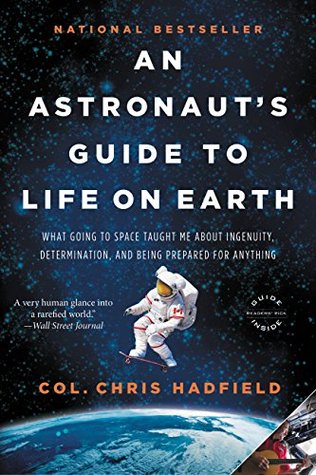More on this book
Community
Kindle Notes & Highlights
Read between
April 4 - April 29, 2022
Square astronaut, round hole. It’s the story of my life, really: trying to figure out how to get where I want to go when just getting out the door seems impossible.
See, a funny thing happened on the way to space: I learned how to live better and more happily here on Earth. Over time, I learned how to anticipate problems in order to prevent them, and how to respond effectively in critical situations. I learned how to neutralize fear, how to stay focused and how to succeed.
Competence means keeping your head in a crisis, sticking with a task even when it seems hopeless, and improvising good solutions to tough problems when every second counts. It encompasses ingenuity, determination and being prepared for anything.
To me, it’s simple: if you’ve got the time, use it to get ready. What else could you possibly have to do that’s more important? Yes, maybe you’ll learn how to do a few things you’ll never wind up actually needing to do, but that’s a much better problem to have than needing to do something and having no clue where to start.
In my experience, fear comes from not knowing what to expect and not feeling you have any control over what’s about to happen. When you feel helpless, you’re far more afraid than you would be if you knew the facts. If you’re not sure what to be alarmed about, everything is alarming.
Being forced to confront the prospect of failure head-on—to study it, dissect it, tease apart all its components and consequences—really works. After a few years of doing that pretty much daily, you’ve forged the strongest possible armor to defend against fear: hard-won competence.
Nothing boosts confidence quite like simulating a disaster, engaging with it fully, both physically and intellectually, and realizing you have the ability to work the problem.
The upshot of all this was that Helene decided to save the Himalayas for another year and hike in Utah instead. In fact, everyone who participated in the sim discovered weaknesses in their own planning and went back to the drawing board on a few items. (Except me, but that’s what happens when you’re dead.)
In a real crisis like that, a group hug isn’t going to save you. Your only hope is knowing exactly what to do and being able to do it calmly and quickly.
When you’re the author of your own fate, you don’t want to write a tragedy. Aside from anything else, the possibility of a sequel is nonexistent.
A lot of people talk about expecting the best but preparing for the worst, but I think that’s a seductively misleading concept. There’s never just one “worst.” Almost always there’s a whole spectrum of bad possibilities. The only thing that would really qualify as the worst would be not having a plan for how to cope.
“When Chris talks, he has a very clear and authoritative manner—but don’t let yourself be lulled into a feeling of complete confidence that he’s right. Yes, he used to be a spacewalking instructor and evaluator and he’s Mr. EVA, but he hasn’t done a walk since 2001. There have been a lot of changes since then. I don’t want the junior trainers to ignore that little voice inside and not question something just because it’s being said with authority by someone who’s been here a long time.”
Early success is a terrible teacher. You’re essentially being rewarded for a lack of preparation, so when you find yourself in a situation where you must prepare, you can’t do it. You don’t know how.
Ultimately, leadership is not about glorious crowning acts. It’s about keeping your team focused on a goal and motivated to do their best to achieve it,
If you start thinking that only your biggest and shiniest moments count, you’re setting yourself up to feel like a failure most of the time.


